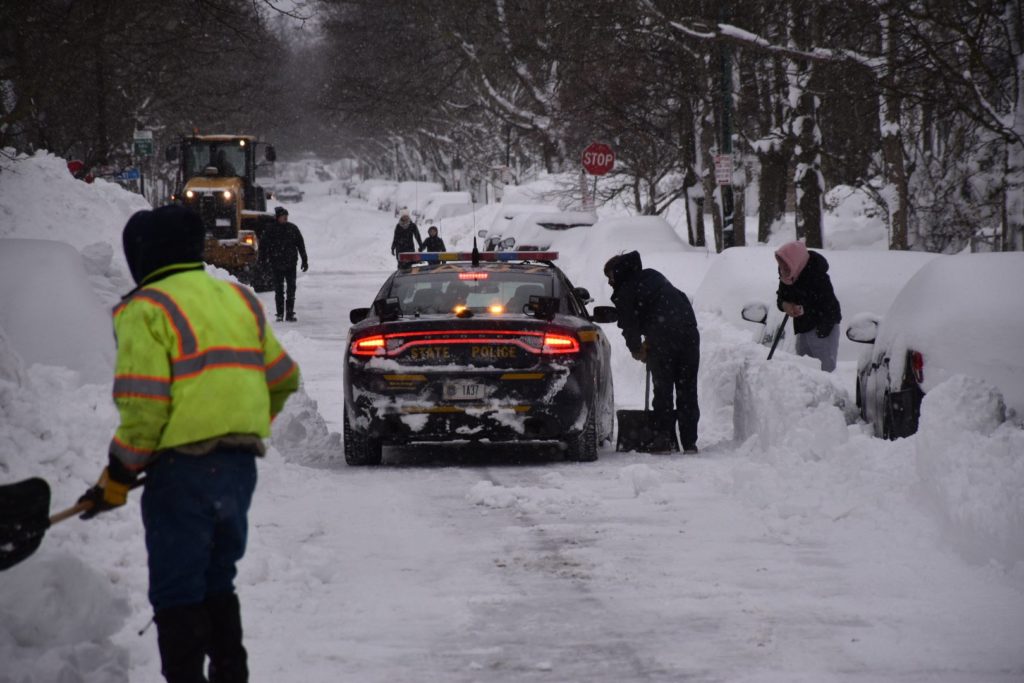
While the Bomb Cyclone moved through portions of the United States in the days before Christmas, the death toll continues to grow as travel woes persist for many trying to fly home from their holiday getaway.
According to flight tracking website FlightAware, there were 2,887 flight cancelations and 3,970 flight delays within, into, or out of the United States today, with Southwest Airlines leading the pack with the most impacted flights. 61% of Southwest Airlines flights are cancelled today, with 7% of the balance that are flying delayed.
The death toll from the storm is now up to 85, with deaths reported across 19 states and 1 Canadian province. While Colorado, Georgia, Kansas, Kentucky, Maryland, Michigan, Mississippi, Missouri, Ohio, Oklahoma, Oregon, Pennsylvania, South Carolina, South Dakota, Tennessee, Vermont, and Wisconsin all reported deaths, New York reported the most at 34. Ohio has the grim honors of being second with 16 deaths.
Most deaths from the storm in New York State are from the Buffalo region, where many deaths were of pedestrians who became disoriented in the snow, drivers who froze to death or suffocated while trapped in their stranded vehicle, or from cardiac arrest while shoveling snow. Other residents died because emergency crews were unable to respond to their medical crisis in the height of the storm.
On Christmas Day, Southwest Airlines cancelled 48% of its scheduled flights. The following day, December 26, Southwest cancelled another 2,886 flights, which represented approximately 70% of the scheduled flights for that day. The U.S. Department of Transportation called the cancellations “unacceptable” and said it would “closely examine” Southwest’s actions.
“When a flight is canceled or severely delayed and it’s the airline’s fault, they are responsible for taking care of the customer. Southwest needs to make good on its promise to travelers,” Tweeted the U.S. Department of Transportation about Southwest’s ongoing service disruptions.
While Southwest has publicly blamed their woes on the weather, documents from Southwest staffers suggest otherwise.
On December 21, Chris Johnson, Vice President of Ground Operations, issued a memorandum entitled “State of Operational Emergency – TWU” days before the winter storm hit. “We have received an unusually high number of absences this afternoon / evening from our Denver Ramp Agent Employees. We have an obligation to our Customers and to our fellow Employees to safely and efficiently run our operation. Therefore, due to the personnel shortage, I am declaring Denver in a State of Operational Emergency effective December 2022,” wrote Johnson in his memo.
Randy Barnes, President of TWU Local 555 Union representing ground workers at Southwest Airlines wrote in a press release, “When you’re dealing with sub-zero temperatures, driving winds and ice storms you can’t expect to schedule planes as if every day is a sunny day with moderate temperatures and a gentle breeze.” Barnes suggesting adding more ground crews, pacing out flights better, and rescheduling flights to allow for more travel issues during winter months.
Casey Murray, President of the Southwest Airlines Pilots Association (SWAPA) and a captain at the airline, was more scathing in his criticism of the airline. “We all know that the Company has had its head buried in the sand when it comes to its operational processes and IT. Worst of all, through the numerous and ever-increasing meltdowns that we have endured during the last 20 months (much less the last decade) Southwest has had enough crews in place to operate the planned schedule. It’s not until SkySolver and scheduling roulette begin that the network spirals out of control. The Company’s failed solution? Hire more. Add reserves. Optimize and reassign Pilots online. We aren’t undermanned. We’re undermanaged. Even with the correct number of Pilots on any given day, the house of cards fails, and fail it does with ever-increasing frequency and severity.” He added, “At this point, I’m concerned for our airline. I’m concerned that our CEO hasn’t been in contact with your president or anyone from SWAPA during this crisis. We won’t survive another 10 years as a company if this continues, and maybe no more than five.”